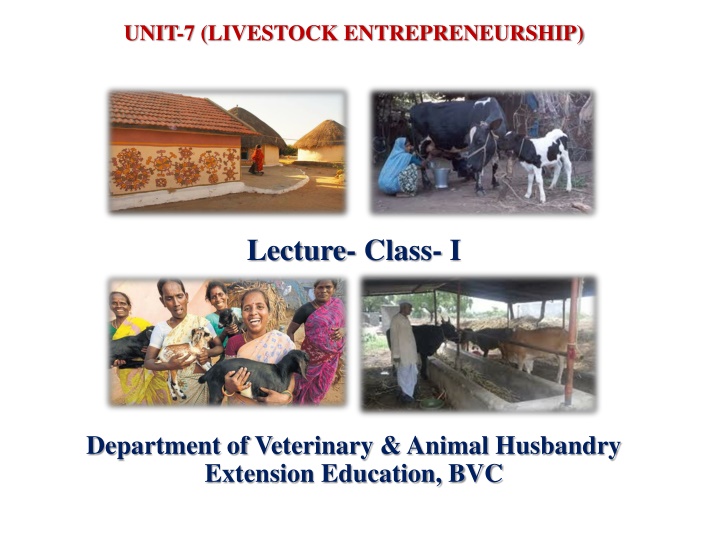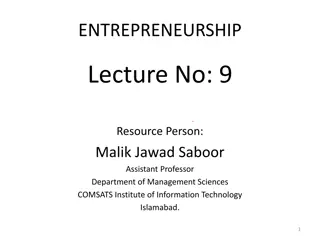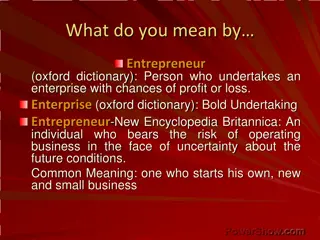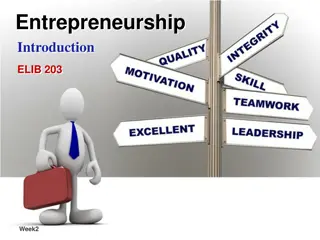
Livestock Entrepreneurship: Key Concepts and Factors for Success
Explore the fundamentals of livestock entrepreneurship, including the definition of an entrepreneur, different theories, forms of entrepreneurship, factors influencing entrepreneurial success, and the essential characteristics of an entrepreneur. Learn the significance of identifying opportunities, managing organizations, and creating value in the dynamic world of livestock entrepreneurship.
Uploaded on | 3 Views
Download Presentation

Please find below an Image/Link to download the presentation.
The content on the website is provided AS IS for your information and personal use only. It may not be sold, licensed, or shared on other websites without obtaining consent from the author. If you encounter any issues during the download, it is possible that the publisher has removed the file from their server.
You are allowed to download the files provided on this website for personal or commercial use, subject to the condition that they are used lawfully. All files are the property of their respective owners.
The content on the website is provided AS IS for your information and personal use only. It may not be sold, licensed, or shared on other websites without obtaining consent from the author.
E N D
Presentation Transcript
UNIT-7 (LIVESTOCK ENTREPRENEURSHIP) Lecture- Class- I Department of Veterinary & Animal Husbandry Extension Education, BVC
Topics covered Definition of entrepreneur, entrepreneurship, enterprise and manager. Difference entrepreneur and enterprise, entrepreneur and manager. between entrepreneur and entrepreneurship, Theories of entrepreneurship: Sociological theory, economic theory, cultural theory, psychological theory. Types, characteristics and functions of an entrepreneur. Forms of entrepreneurship: (Sole proprietorship, partnership, corporation, cooperative, joint stock company, Private and Public Limited Company).
Entrepreneur French word entreprende : to undertake ie who undertake the risk of new enterprise. Richard Cantilon : first used the term entrepreneur to refer economic activities. An entrepreneur is a person who buy factor services at certain price with a view to selling its product at uncertain price. J.A. Scumpeter : entrepreneur as an innovator. Oxford dictionary : one who organize, operates and assumes the risk in a business venture in an expectation of making profit. Shumpeter regarded the entrepreneur as an innovator on the other hand entrepreneurship as a dynamic process with information and risk bearing as its two basic elements with multiplicity of activities toward establishment of an enterprise
According to Behal entrepreneurship is a process of change comprising the following three components: The identification, evaluation and exploitation of an opportunity. The management of a new or transformed organization so as to facilitate production and marketing of new goods and services. The creation of value through successful exploitation of new ideas According to Cole entrepreneurship comprises any purposeful activity that initiates, maintains or develop a profit oriented business in political and social circumstances surrounding the business.
Factors responsible for entrepreneurship Entrepreneurs generally grow in the tradition of their families and Society and internalize certain values and norm for these sources. Religious social and cultural factors also influence the individual for taking up entrepreneurial career. Psychological factors like high need for achievement, determination for unique accomplishment, self-confident, creativity, vision, leadership etc. promote entrepreneurship among individual Political system which promotes free-market, individual freedom and private enterprise will promote entrepreneurship The economic policies of the Government and other financial Institution and opportunities available in the society as a result of search policies play a crucial role in exerting direct influence on entrepreneurship
Characteristics of an Entrepreneur Achievement motivation entrepreneur have high achievement motivation that is an urge for excellence and desire for success in competing with standard set by others as well as one set for oneself. Personal drive and energy high personal drive and energy is one of the important characteristics of entrepreneur that can work for long hours for day together with minimum basic amenities Self-confident the entrepreneurs believe that they are capable of doing things and have the ability to control the actions and activities of other people Risk Taking entrepreneur prefer to take calculated risk in dealing with a challenging situation. He is a moderate risk taker. Taking initiative entrepreneur is prone to take initiative and explore all possibilities to reach the goal Longterm involvement : entrepreneurs are found to set goals that demand long term involvement and required perseverance
Goal setting he set goals for himself both in term of what you want and when. Systematic Planning entrepreneur believes in Planning and take logical steps to achieve the goals Dealing with failure failure does not deter an entrepreneur rather he analyses the failure as feedback information and take appropriate corrective measures. Entrepreneurs are oriented towards problem solving Money as a measure entrepreneur see money as a measure of their success as against the general stigma attached to money making Information seeking entrepreneur causes information seeking behaviour and is always on the lookout for relevant current information related to the product, process, market etc to take sound decisions Leadership he follow a style of persuasive leadership which motivate the team members to put in their maximum efforts Use of resources procurement and judicious utilization of resources Networking developing a good network of relationship with the connected with Enterprise






















